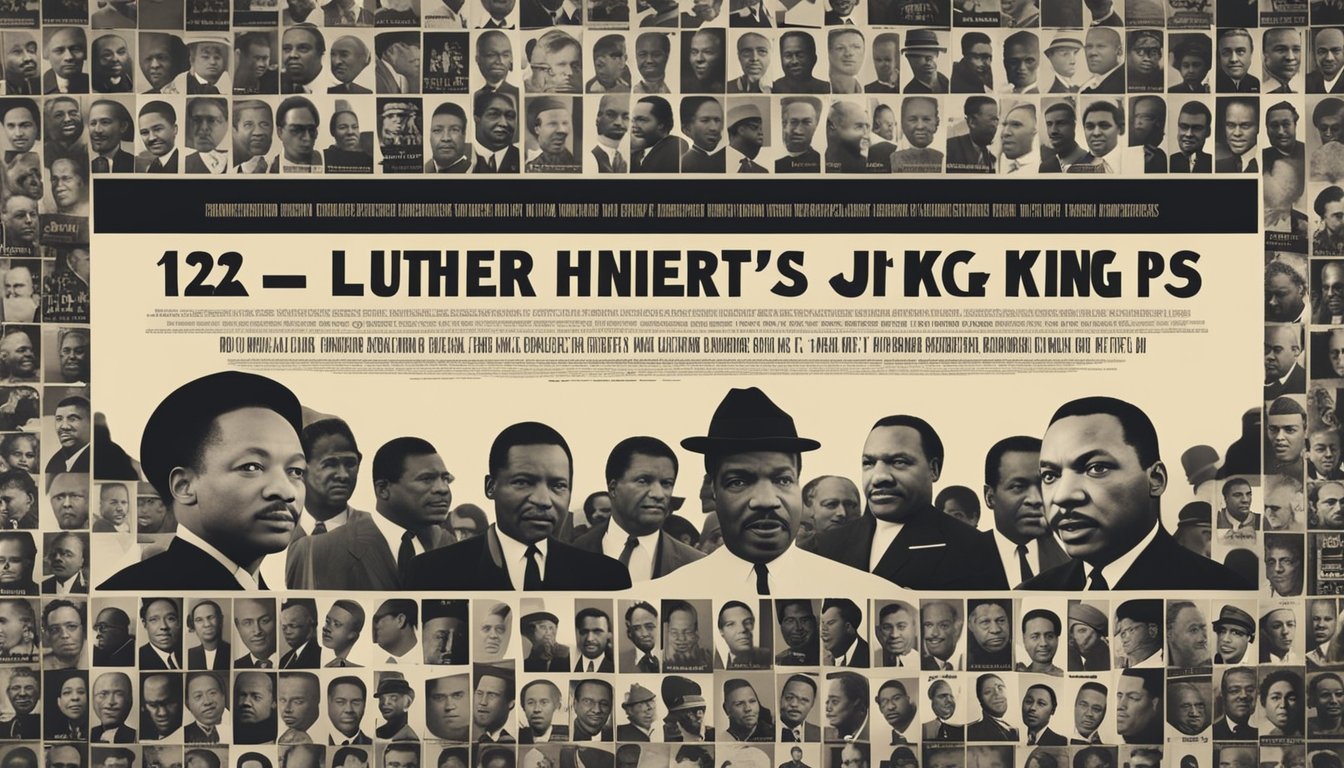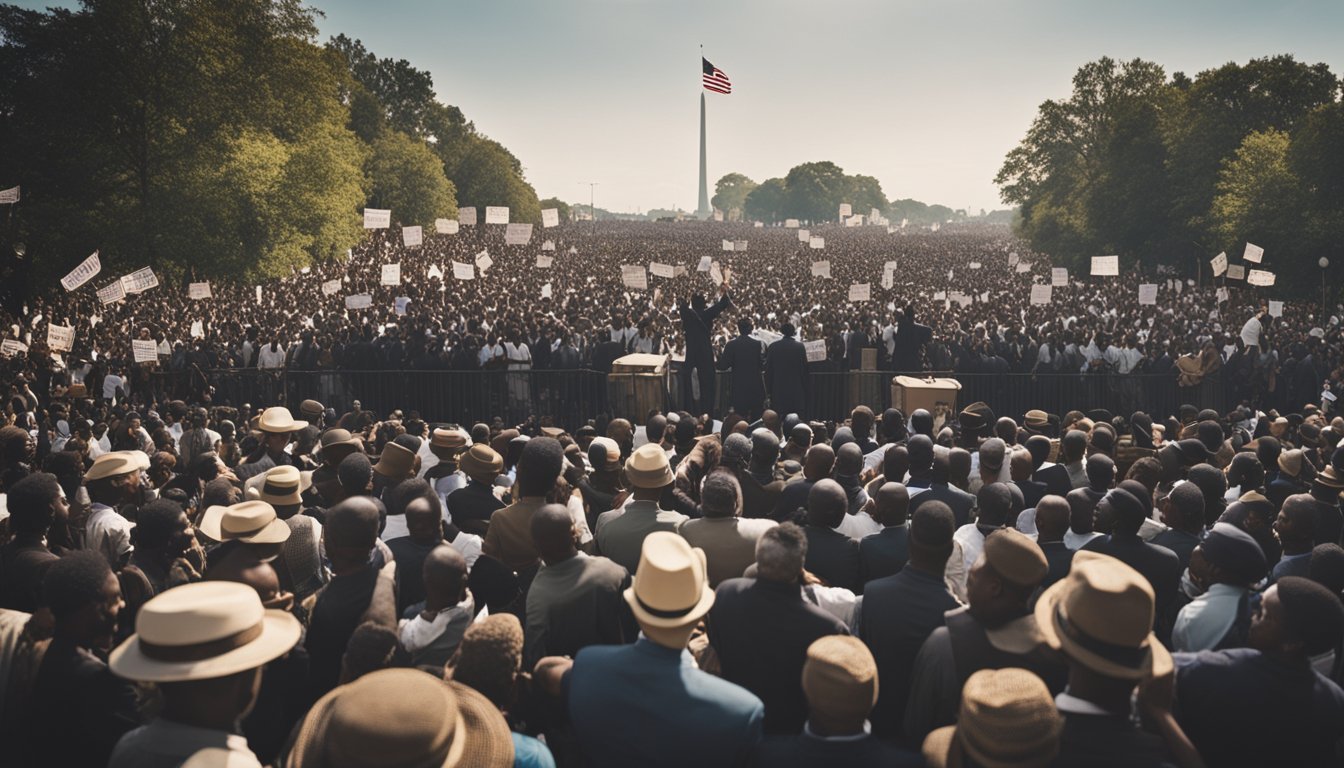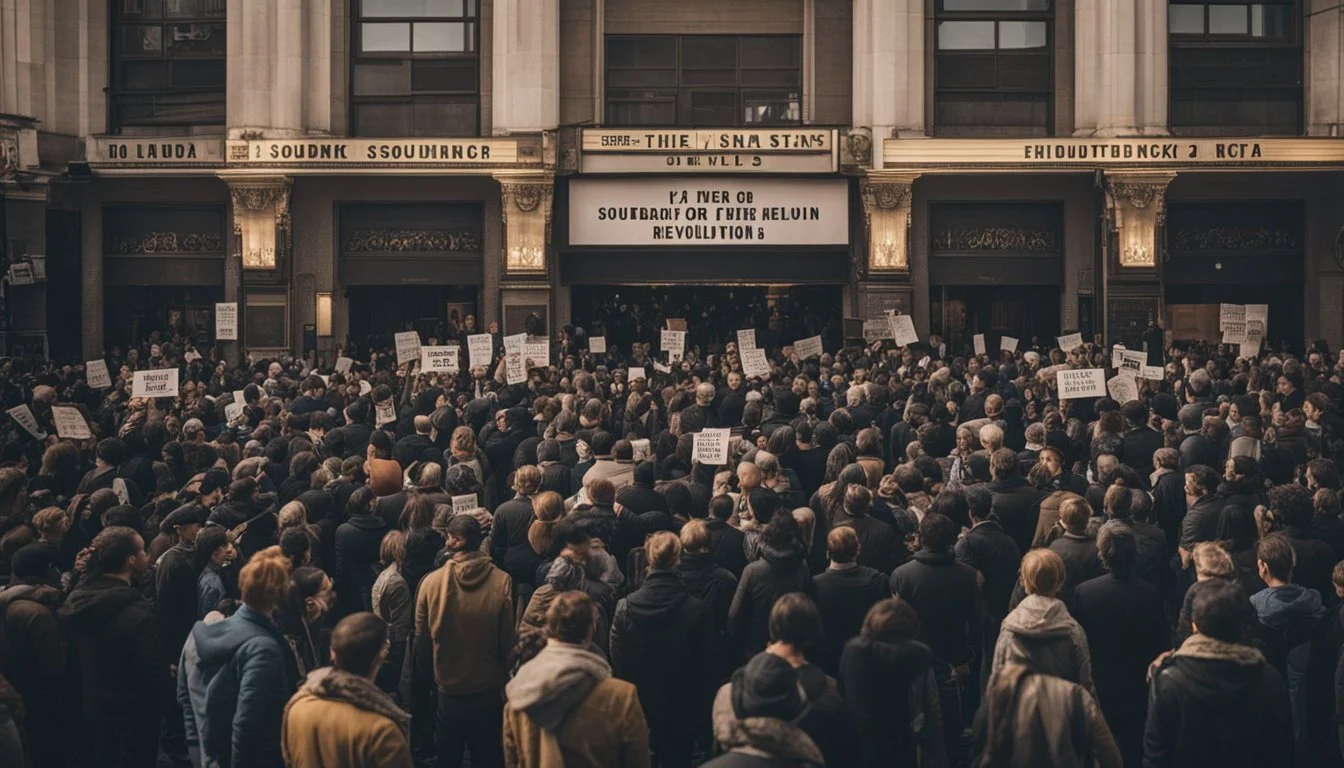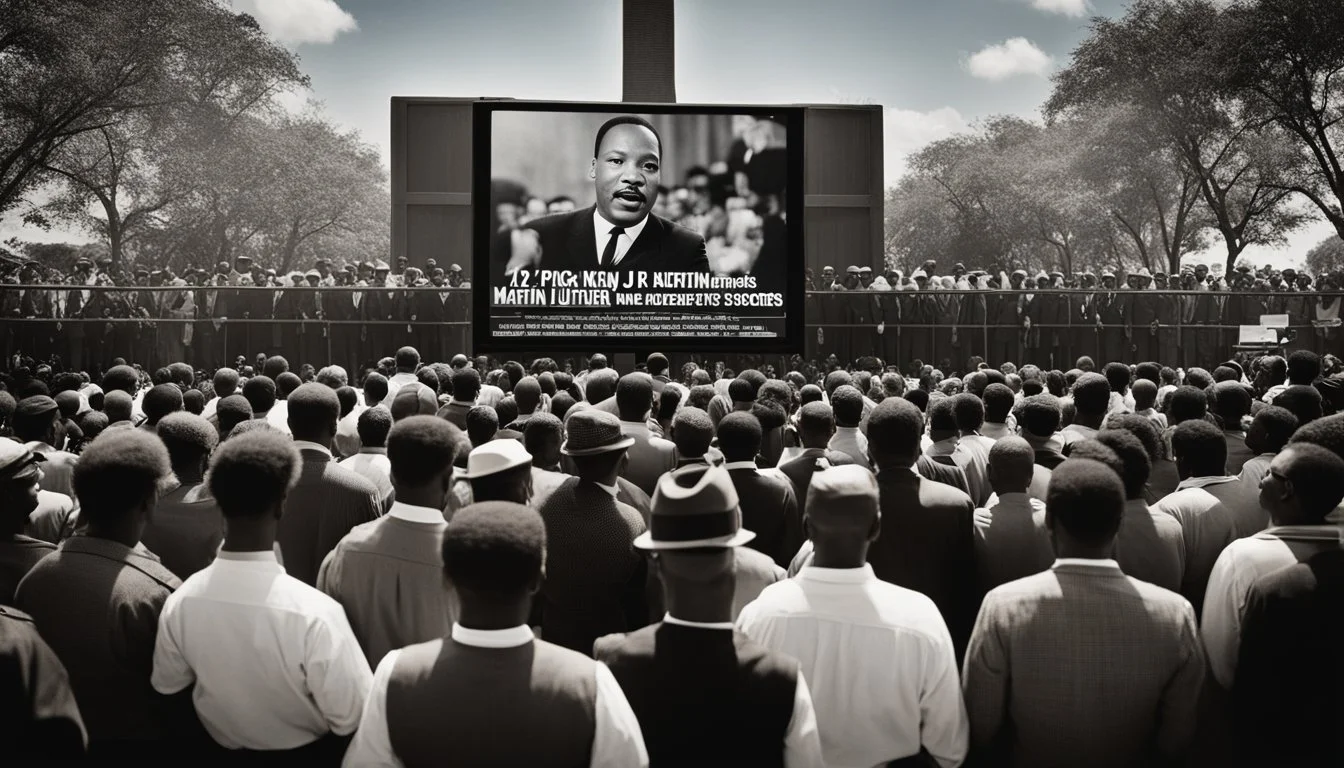12 Documentaries on the Political Impact of Martin Luther King Jr.
Essential Viewing for Understanding His Legacy
The political impact of Martin Luther King Jr. is a cornerstone of American history. His work in the Civil Rights Movement changed the landscape of the United States, ensuring greater equality and justice for African Americans. Documentaries serve as powerful tools to understand and reflect on his significant contributions and the ongoing struggle for civil rights.
Exploring these documentaries offers viewers a comprehensive insight into King's strategies, challenges, and enduring legacy. These films not only celebrate his monumental achievements but also educate on the broader social and political impact of his life's work. This article will guide you through twelve essential documentaries that capture the essence of Martin Luther King Jr.'s political influence.
1) Selma (2014)
"Selma," directed by Ava DuVernay, is a historical drama that captures the essence of Martin Luther King Jr.'s leadership and the significant events surrounding the 1965 Selma to Montgomery marches.
David Oyelowo stars as Martin Luther King Jr., providing a compelling portrayal of the leader's strategic efforts and personal struggles.
The film sheds light on the challenges faced by African Americans in registering to vote during the 1960s.
It emphasizes the obstacles imposed by Southern states and the violent resistance encountered by nonviolent demonstrators.
The movie's narrative serves as an impactful exploration of the political and social hurdles of the era.
"Selma" is a powerful visual recount of a pivotal movement that significantly shaped the civil rights landscape in the United States.
For more detailed information, visit the IMDb page for Selma.
2) I Am MLK Jr. (2018)
"I Am MLK Jr." is a feature-length documentary dedicated to exploring the life and legacy of Dr. Martin Luther King Jr. The film was made to celebrate his contributions to the Civil Rights Movement in the United States. It provides an in-depth look at his activism and the impact of his work on modern-day civil rights.
The documentary features contemporary perspectives and is structured around key events in King's life. These events highlight his role as an American icon and his tireless efforts to combat racial injustice. The film includes interviews with notable figures and captures how King's influence continues to resonate.
Produced and directed by Michael Hamilton and John Barbisan, this documentary also delves into lesser-known aspects of King's life. It aims to humanize the civil rights leader by showcasing his personal struggles and triumphs. Viewers gain a nuanced understanding of King’s enduring legacy and the principles he stood for.
For more information on "I Am MLK Jr." visit IMDb: I Am MLK Jr. (2018)
3) King in the Wilderness (2018)
"King in the Wilderness" offers a powerful look at the final years of Martin Luther King Jr. The documentary focuses on the period from 1966 to 1968, culminating in his assassination.
This film delves into the complex challenges King faced, including criticism from within the civil rights movement and increasing pressure from broader political forces.
Directed by Peter W. Kunhardt, the documentary features archival footage and interviews with those who were close to King, providing intimate insight into his struggle and resilience.
Through its detailed portrayal, the film sheds light on the personal and professional battles that defined King's later years. This perspective helps viewers grasp the full scope of his enduring impact.
For more information about this documentary, visit IMDb.
4) Eyes on the Prize: America's Civil Rights Years (1987)
"Eyes on the Prize: America's Civil Rights Years" is a highly respected documentary series that chronicles the American civil rights movement from 1954 to 1965.
The series originally aired on PBS and captures pivotal moments such as the Montgomery bus boycott and the March on Washington.
Created and executive produced by Henry Hampton and narrated by Julian Bond, the series stands out for its use of archival footage and interviews with key figures involved in the movement.
The documentary's commitment to presenting the viewpoints of ordinary men and women underscores the collective effort behind the civil rights movement.
"Eyes on the Prize" has been praised for its educational value and remains a significant resource for those interested in understanding this critical period in American history.
For more information on "Eyes on the Prize," visit IMDB.
5) Citizen King (2004)
"Citizen King" is a documentary produced by PBS as part of the American Experience series. It explores the final five years of Dr. Martin Luther King Jr.'s life, from his famous "I Have a Dream" speech in 1963 to his assassination in 1968.
The film delves into King's personal and political struggles during this period. It highlights his ongoing battle against systemic racism while focusing on his push for economic justice and his stance against the Vietnam War.
Using a mix of historical footage and interviews, "Citizen King" provides an in-depth look at King's efforts in civil rights. The documentary captures the essence of his leadership and the challenges he faced, making it a valuable resource for understanding his political impact during those crucial years.
For more information, please visit IMDb.
6) The Witness: From the Balcony of Room 306 (2008)
Directed by Adam Pertofsky, this 2008 documentary short film commemorates the life and assassination of Dr. Martin Luther King Jr. It captures the final moments leading to his death on April 4, 1968.
Reverend Samuel "Billy" Kyles, standing beside King on the balcony of the Lorraine Motel, shares his firsthand account. His recollections serve as a powerful reminder of King’s sacrifice and the circumstances surrounding that tragic event.
The film was recognized for its impactful storytelling and received an Oscar nomination in the "Best Documentary Short Subject" category at the 81st Academy Awards. The combination of personal testimony and historic context makes it a significant documentary for understanding King's legacy.
For more information, please visit Wikipedia.
7) MLK/FBI (2020)
"MLK/FBI" is a documentary directed by Sam Pollard.
It delves into the United States government's surveillance and harassment of Dr. Martin Luther King Jr. during the 1960s.
The film is rooted in newly declassified documents.
The documentary highlights the extensive efforts by the FBI, under J. Edgar Hoover, to undermine King.
Through archival footage, the film provides a detailed look at the techniques used by the FBI to monitor King.
It explores the political pressures and personal challenges faced by King as he pursued civil rights.
For more information, see Wikipedia.
8) Rejoice and Shout: A Celebration of Gospel
"Rejoice and Shout" (2010) is a documentary directed by Don McGlynn. It explores the 200-year history of gospel music, emphasizing its roots and evolution within African-American Christianity.
The film features performances and insights from gospel legends like The Staple Singers, The Clara Ward Singers, The Dixie Hummingbirds, and Sister Rosetta Tharpe.
Jekalyn Carr, a contemporary gospel artist, opens the movie with a powerful rendition of "Amazing Grace." The documentary also features memorable performances by Mavis Staples and Marie Knight, highlighting the profound influence of gospel music on both cultural and spiritual levels.
"Rejoice and Shout" combines historical footage with present-day interviews and performances, making it a rich tapestry of musical history. Smokey Robinson and Andraé Crouch provide additional perspectives that enrich the narrative.
The film does not just celebrate the music; it also illuminates the broader cultural and social impacts of gospel music in American history. It stands as a testament to the enduring power and influence of this musical genre.
For more information: Rejoice and Shout on IMDb.
9) The Road to Memphis
"The Road to Memphis" (2010) documents the final days leading up to the assassination of Dr. Martin Luther King Jr. This documentary offers a poignant look at the complex interplay of political tensions and social movements in America during the late 1960s.
Through vivid storytelling, the film portrays Martin Luther King Jr.'s unwavering commitment to civil rights and social justice. The focus is on King's visit to support the sanitation workers' strike in Memphis, Tennessee.
The documentary delves into the perspectives of both Dr. King and James Earl Ray, the man convicted of assassinating King. This dual approach sheds light on the broader societal forces at play during a turbulent period in American history.
Viewers gain insight into the events of April 3, 1968, when King delivered his famous “I've Been to the Mountaintop” speech at the Mason Temple. This speech became one of his most iconic addresses, delivered just a day before his assassination.
For more information on the film, visit IMDb.
10) King: A Filmed Record... Montgomery to Memphis (1970)
"King: A Filmed Record... Montgomery to Memphis" is a profound documentary and cinematic biography of Martin Luther King Jr. It chronicles his leadership in the Civil Rights Movement, showcasing his nonviolent campaign for social and economic justice.
Directed by Sidney Lumet and Joseph L. Mankiewicz, the film is constructed from a wealth of archival footage. It includes key moments from King's public life, speeches, and marches.
The documentary features appearances by numerous figures, such as Harry Belafonte and Ruby Dee. Its uncut version runs for approximately 185 minutes. It presents a detailed record of King's efforts and the broader Civil Rights Movement.
11) Soundtrack for a Revolution (2009)
"Soundtrack for a Revolution" brings the story of the American civil rights movement to life through its powerful music. The documentary, directed by Bill Guttentag and Dan Sturman, premiered in 2009. It highlights the freedom songs that fueled the movement, showcasing their significance in the fight for justice and equality.
The film features performances by contemporary artists like John Legend, Wyclef Jean, and The Roots, offering a fresh take on these historic songs. Archival footage and interviews with civil rights leaders, such as John Lewis and Harry Belafonte, provide deeper insights into the movement's impact and the role of music.
The documentary blends historical narratives with modern musical interpretations, creating a unique and engaging experience. It offers both a historical perspective and a tribute to the musical heritage that supported the push for civil rights.
"Soundtrack for a Revolution" was showcased at prestigious film festivals like Cannes and Tribeca and was short-listed for a 2010 Academy Award.
For more information on "Soundtrack for a Revolution," visit its Wikipedia page.
12) Freedom on My Mind (1994)
Freedom on My Mind is a documentary directed by Connie Field and Marilyn Mulford.
The film chronicles the story of the Mississippi Voter Registration Project, an integral part of the Civil Rights Movement in the 1960s.
Through interviews and archival footage, it highlights the struggles and determination of activists fighting for African American voting rights.
The documentary provides a detailed account of the efforts and challenges faced by those who were instrumental in bringing about societal and legislative change.
The film emphasizes the grassroots organization and the crucial role of community involvement in the movement.
Freedom on My Mind showcases the personal sacrifices and unwavering dedication of individuals who risked their lives for the cause.
Link: Freedom on My Mind on IMDb
The Role of Martin Luther King Jr. in the Civil Rights Movement
Martin Luther King Jr. played a crucial role in advancing the Civil Rights Movement through his early activism and leadership in pivotal protests and marches. His commitment to nonviolent resistance defined his efforts and garnered national and international support.
Early Activism
Martin Luther King Jr.’s early activism began in the mid-1950s. As a young Baptist minister in Montgomery, Alabama, he quickly became involved in the struggle for civil rights.
In 1955, King led the Montgomery Bus Boycott after Rosa Parks was arrested for refusing to give up her seat to a white person. This boycott lasted 381 days and resulted in the Supreme Court ruling that segregation on public buses was unconstitutional.
King’s belief in nonviolent protest stemmed from his studies of Mahatma Gandhi’s methods. He preached unity, understanding, and the power of love to overcome hate, which resonated deeply in the segregated South.
Leadership in Key Protests and Marches
King’s leadership extended to organizing and participating in significant protests and marches. He was a central figure in the 1963 March on Washington for Jobs and Freedom, where he delivered his iconic “I Have a Dream” speech. This demonstration highlighted the economic disparities faced by African Americans and called for civil and economic rights.
In 1965, King led the Selma to Montgomery marches to fight for voting rights. The brutal response from law enforcement, especially on "Bloody Sunday", galvanized public opinion. This led to the passage of the Voting Rights Act of 1965.
King also helped organize the Birmingham Campaign in 1963, which aimed to desegregate public facilities in Birmingham, Alabama. The campaign’s success marked a turning point in the movement, showing the effectiveness of sustained, nonviolent protest.
Political Legacy and Influence
Martin Luther King Jr. had a profound effect on American politics, inspiring legislative changes and influencing future social movements that continued his work for justice and equality.
Legislative Changes and Achievements
The Civil Rights Act of 1964 and the Voting Rights Act of 1965 stand as landmark achievements of the Civil Rights Movement, significantly influenced by King’s advocacy. His leadership in the Birmingham Campaign brought national attention to the brutality of segregation, directly swaying public opinion and legislators toward drastic legal reform.
The Civil Rights Act prohibited discrimination based on race, color, religion, sex, or national origin, while the Voting Rights Act aimed to remove barriers that had long prevented African Americans from voting. These laws reshaped the social and political landscape, creating more equitable resources and opportunities for minorities in the United States.
Impact on Subsequent Social Movements
King's dedication to nonviolent protest and his eloquent oratory inspired countless future activists and movements. The nonviolent strategies he championed became central to subsequent efforts for social change.
Movements such as the Anti-Apartheid struggle in South Africa and the U.S. labor rights movements adopted King's principles of peaceful resistance. His emphasis on economic equality influenced modern movements like Occupy Wall Street and the Fight for $15, which highlight ongoing economic disparities.
Furthermore, King's commitment to social justice continues to inspire groups advocating for racial equity, LGBTQ+ rights, and environmental justice, proving that his influence extends well beyond his lifetime.
Media Representation and Public Perception
Martin Luther King Jr.'s powerful oratory and strategic use of media played a crucial role in shaping public perception of the Civil Rights Movement. His representation in documentaries provides insights into the evolution of his image and various aspects of his activism.
Evolution of King's Image Over Time
Martin Luther King Jr.'s image has undergone significant transformations from the 1960s to the present.
Initially, he was portrayed predominantly as a civil rights leader focused on nonviolent protest. Documentaries like Struggle in Montgomery highlight his pivotal role in the Montgomery Bus Boycott, showing his steadfast resolve amidst threats and violence.
As years progressed, more nuanced portrayals emerged. Efforts like the MLK/FBI documentary reveal the relentless FBI surveillance and harassment he endured, depicting the challenges he faced from government agencies.
Moreover, his speeches and sermons, such as those compiled in The Papers of Martin Luther King, Jr., showcase his broader advocacy for social justice and his fight against economic inequality, expanding the understanding of his legacy beyond just civil rights.
Major Documentaries and Their Perspectives
Various documentaries have explored different facets of King's life and impact.
Boycott (2001) delves into the Montgomery Bus Boycott's strategic milestones, reflecting on how this crucial event solidified his role as a leading figure in the Civil Rights Movement.
MLK/FBI uncovers the depth of the FBI's intrusive scrutiny, portraying a climate of suspicion and hostility that sought to undermine his influence. This perspective highlights a darker aspect of his journey, where government surveillance clashed with his pursuit of justice.
Additionally, films maintained by institutions like the Martin Luther King Jr. Freedom Center focus on his personal experiences and family life, adding layers of human emotion and resilience to his public image.
These documentaries collectively offer a multifaceted portrait of Martin Luther King Jr., each contributing unique perspectives that enrich public understanding of his enduring legacy.









